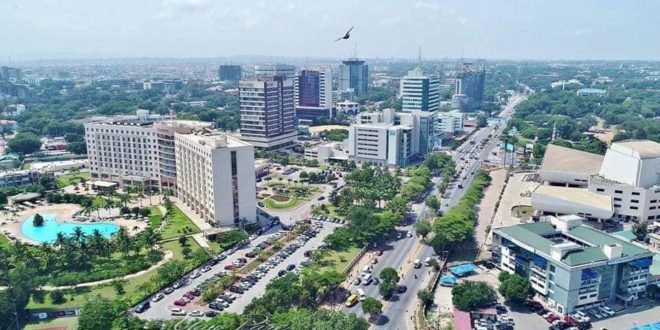Host of Maakye on Onua TV/FM, Blessed Godsbrain Smart has has wondered why Ghana is begging for alms whilst it is the third richest country in the world.
Speaking Wednesday, September 28, 2022, on Akoma FM’s GhanaMaadwo political and current affairs show hosted by JB, Captain Smart noted the Ghana is the richest country in West Africa, Africa and the third richest in the world.
Explaining his assertion, he listed the values of Ghana’s mineral resources and other natural endowments with regards to the International Minerals Commission.
“Ghana is the richest country in West Africa, the richest in Africa, and third richest in the world. Our remaining total gold deposit is $14.4 trillion.
“Ghana’s oil deposit at discovery was $9.4 trillion.
When Kufuor identified bauxite in several regions, the Canadians who came for the prospection valued our bauxite at $7.2 trillion,” he disclosed, adding that, “the Canadians told us if for nothing at all, we shouldn’t give out our bauxite for free when we mine else we’ll go back to slave trade.”

According to available documents after the prospection was made at Kufuor’s era, Ghana was advised to indulge in strategic mining, dividing the royalties into 21 parts and adding five more portions of the shares to the community where the mineral is mined.
The documents kufuor did said we should do strategic mining. They said the bauxite should be divided into 21 and give five more to the regions of deposit.
Also, the International Minerals Commission had valued said Ghana’s diamond at Akwatia as the most valuable diamond deposit in the world.
They advised that the Akwatia diamond must be reserved for the world for future use. The Akwatia diamond Captain Smart explained was valued at $89 billion then.
“Do you know we now have lithium in Ghana? The value of our lithium is $3.4 trillion. Our lithium is 7 bar point ahead of what is mined in Congo. We’ve given it to Australia for $2 billion. The question is why are we poor?,” he quizzed.
Source: Onuaonline
Fact Check
Richest Countries in the World 2022
Many people who swear that they have discovered the secret to overall happiness claim that it has nothing to do with money. There is an incredibly high chance that you have heard the phrase, “Money cannot buy happiness.” This statement is undeniably accurate, but there is also a strong counterargument—significant evidence shows that sometimes money can enable financial security that leads you to feel happier overall. Money can’t buy happiness … can it? The truth behind the saying
The core truth behind this counterargument is that many negative feelings and situations arise from a less-than-ideal fiscal standing. When one’s credit score is low, even basic expenses such as renting an apartment, purchasing a home, or just getting a car can be difficult or impossible to finance. Similarly, people on a limited income can find it challenging to keep up with bare essentials such as electricity, water, and even groceries. In short, a lack of money can severely hinder one’s ability to afford the fundamental “must-have” things human beings need to get by, let alone luxury items. This presence or lack of money can also impact one’s health. Wealthy people can often afford better medical treatment than those with less money, especially in countries without universal health care. Moreover, an unfavorable financial status can be a major source of stress, anxiety, or depression.
What about the argument that money cannot buy cherished memories, which are arguably the most precious treasure of all? Absolutely true. Granted, money can buy many things that can help create those memories, such as vacations, tickets to concerts or sporting events, nights out on the town, trips to the movies or the amusement park, gifts for loved ones, and so on. But creating those memories is still up to the individual. Plus, there are many other treasures that money can’t enable, including love, trust, friendship, and spiritual peace.
Ultimately, the adage is true: Money cannot buy happiness. To quote another common saying, “the best things in life aren’t things.” However, a persistent lack of money can trigger negative effects ranging from emotional stress and unhappiness to poor physical health, so having at least enough money to easily cover one’s living expenses is a worthwhile and unselfish goal.
Gross Domestic Product Per Capita as a measure of national wealth
By examining the gross domestic product per capita(GDP) of each country around the globe, it is possible to rank countries based on wealth and then compare them to each other. Remember, however, that GDP per capita does not necessarily corespond to the average wage a person living in a given country earns. For example, the United States’ GDP per capita in 2019 was $65,279.50, but its average annual wage was $51,916.27 and its median wage was $34,248.45. Even the wealthiest countries have some citizens living in poverty, and even the poorest countries are home to a number of extremely rich residents—but it is a fair indicator of a country’s overall financial health.
The International Monetary Fund releases a definitive ranking of 236 countries and territories of the world. Here’s a sneak peek at the top 10 as of October 2021 (scroll down for the full list):
The Top 10 Richest Countries in the World (by GDP per Capita, current prices US$ – World Bank)
Monaco – $190,512
Liechtenstein – $180,366
Luxembourg – $115,873
Switzerland – $87,097
Macao (China SAR) – $86,117
Ireland – $85,267
Norway – $67,389
United States – $63,543
Denmark – $61,063
Singapore – $59,797
Developing countries often have deficient infrastructures and immature economies, which can put their citizens and corporations at a substantial disadvantage when competing in a global market. Larger disruptions such as war, hunger, disease, and political unrest can also have a tremendous negative impact on a country’s GDP (along with nearly every other aspect of life). Factors such as these are why developing nations are more likely to appear on the list of poorest countries in the world, at least for now.
Tax shelters and Gross National Income (GNI)
GDP values can sometimes be warped by international business practices. For example, some countries (such as Ireland, Liechtenstein, and Switzerland) are regarded as “tax havens” thanks to government tax rules that favor foreign businesses. For these countries, a significant amount of what registers as GDP may actually be money that international companies are funneling through that country, as opposed to income that is actually staying there.
In an attempt to compensate for these tax havens’ effect on national GDPs, many economists also track each country’s Gross National Income, or GNI. This metric is very similar to GDP in that it measures the total value of all the goods and services produced in a country—however, it also adds or subtracts the money coming into or out of the country through foreign businesses. This helps account for tax haven activity and gives an arguably more accurate measure of an economy’s health and wealth.
The Top 10 Richest Countries in the World (by GNI per Capita, Atlas Method, current US$ – World Bank)
Liechtenstein – $116,440
Switzerland – $84,310
Norway – $78,180
Luxembourg – $73,500
United States – $64,530
Ireland – $64,150
Denmark – $63,070
Iceland – $62,420
Qatar – $56,210
Singapore – $54,920
It’s important to note that GNI does not completely filter out all international financial interactions. It just helps to right-size the profits. For example, although their numerical values have changed, notable tax avoidance destinations Ireland, Liechtenstein, and Switzerland are all still in the top 10. What’s more, if the list above were expanded to include territories as well as countries, several of the British Overseas Territories would rank extremely high, with Bermuda ($117,740), Isle of Man ($83,160), the Cayman Islands ($68,200), and the Channel Islands ($66,220) all ranking in the top 10. All four are well-known tax havens with tiny populations, so the profit from even just a few multi-billion-dollar financial maneuvers can significantly elevate per-capita GNI.
That said, in all of these countries’ defense, being a tax haven is obviously only one out of a nearly infinite range of possible sources of national income. For example, most of the British Overseas Territories are also world-famous vacation destinations with a massive tourism sector. Note also that the absence of Monaco on this list is not an indication that it is a tax haven. Rather, GNI data for Monaco was unavailable.
What is the richest country on each continent?
As illuminating and arguably inspiring as it is to peruse the list of richest countries in the world, it’s also worthwhile to examine the data when broken down by continent. For example, a list of the very richest countries on each of the six inhabited continents (by GDP per capita, as above) would look like this:
Richest European Countries 2021: Luxembourg ($118,001), Ireland ($102,390), Switzerland ($93,520)
Richest Asian Countries 2021: Singapore ($97,057), Qatar ($61,790), Israel ($49,840)
Richest Countries in North America 2021: United States of America ($63,416), Canada ($52,790), Puerto Rico ($34,140)
Australia/Oceania: Australia ($62,620), New Zealand ($48,350), Palau ($11,840)
Richest Countries in South America 2021: Uruguay ($16,970), Chile ($16,800), Argentina ($9,930)
Richest African Countries 2021: Seychelles ($13,140), Mauritius ($8,680), Equatorial Guinea ($8,630)
Profiles of Prosperity: Five of the Richest Countries in the World
*Four of which rank among the top tax haven countries in the world.
Luxembourg
The European country of Luxembourg has been classified and defined as the wealthiest country in the world. These findings are based on the gross domestic product per capita values of the countries. The GDP per capita is calculated by dividing the country’s total GDP by the population size, with the result being the GDP value per capita within a country. The GDP value per capita of a country is an excellent way of measuring a country’s wealth because it considers the standard of living. By taking the GDP per capita of a country and comparing it to the GDP per capita of another country, you’ll be able to accurately determine which country is more prosperous than another, with a few other factors being taken into consideration as well. Looking at Luxembourg in particular, the GDP per capita reached a chart-topping $131,300 US$ in the October 2021 report.
Ireland
The GDP per capita of Ireland is $102,390 US$ in October 2021. For reference, Ireland’s GDP in 2017 was $70,220 US$. So things are definitely looking up in Ireland—however, the country is another notorious tax haven, so perhaps the average Irishman hasn’t found the pot of gold at the end of the rainbow after all.
Switzerland
Switzerland is yet another of the top five wealthiest countries based on its GDP per capita, which sat at a very notable $93,520 in October 2021.
Norway
With an October 2021 GDP per capita of $82,240 US$, this country is not only one of the top five richest worldwide, it’s the only one not also considered an international tax shelter.
United States of America
Considering the lengths many large U.S. corporations go to hide their own profits in overseas tax shelters, it may be surprising to learn that the United States is itself considered a tax haven by many financial watchdog groups. However, many national and state-level regulations enable international clients to move their money through U.S.-based accounts while incurring minimal taxes.
Here are the 10 richest countries in the world:
United States – $18.62 Tn
China – $11.22 Tn
Japan – $4.94 Tn
Germany – $3.48 Tn
United Kingdom – $2.65 Tn
France – $2.47 Tn
India – $2.26 Tn
Italy – $1.86 Tn
Brazil – $1.80 Tn
Canada – $1.53 Tn
Richest African Countries 2022
Many of the world’s poorest nations are in Africa. Numerous African economies are unstable, poverty is widespread, and poor access to vaccines is slowing the entire continent’s recovery from the COVID-19 pandemic. Moreover, many African countries, including Cameroon, Chad, Nigeria, and Somalia, are currently at war with either terrorist insurgencies or one another, which puts further strain on their economies.
Despite these challenges, Africa’s 54 countries include some of the fastest-growing economies in the world. The African economy is expected to reach a GDP of $29 trillion by 2050, powered by its agriculture, trade, and natural resources sectors. The region has an eager and expanding workforce, with 20 million new job seekers a year in sub-Saharan Africa alone. Africans are starting to catch up with the rest of the world technologically as well: Every day, more than 90,000 residents of sub-Saharan Africa log on to the internet for the first time. Africa may be the least developed of the major continents—even the richest African countries lag far behind the wealthiest countries in the world—but its potential is both substantial and undeniable.
Using gross domestic product (GDP) to measure the wealth of African countries
While there are several ways to compare various nations’ wealth, one of the best methods is to evaluate each country’s gross domestic product, or GDP. This is the value of all the goods and services produced by a nation in a given year. To make country-to-country comparisons more precise, GDP is often first adjusted for Purchasing Power Parity (PPP), which modifies each country’s GDP relative to local prices, and expressed in a fictional currency called international dollars (INT).
According to the International Monetary Fund, the four top African countries posted GDPs of more than $500 billion (INT) in 2020:
Top 10 Richest African Countries by Overall GDP (INT$ at PPP — International Monetary Fund 2021)
Egypt – $1.38 trillion
Nigeria – $1.14 trillion
South Africa – $861.93 billion
Algeria – $532.57 billion
Morocco – $302.77 billion
Ethiopia – $298.57 billion
Kenya – $269.29 billion
Angola – $217.97 billion
Ghana – $193.63 billion
Sudan – $189.87 billion
In terms of total GDP (PPP INT$), Egypt wins out as the richest country in Africa for 2021. With 104 million people, Egypt is Africa’s third-most populous country. Egypt is also a mixed economy strong in tourism, agriculture, and fossil fuels, with an emerging information and communications technology sector.
Nigeria is the most populous country in Africa, with 211 million residents—nearly twice the population of Egypt—contributing to its GDP. Nigeria is a lower-middle-income, mixed economy focused upon petroleum and (to a lesser extent) agriculture. It is also an emerging market with growing financial, service, communications, and technology sectors.
GDP per capita offers additional insight into African economies
Although GDP is an extremely valuable metric, it is also quite broad. For example, it disregards the number of citizens contributing to a country’s GDP, which means a country with a vast, but less effective workforce can post a higher GDP than a country with a smaller, but efficient workforce. To get a more granular look at this and other factors, economists often turn to GDP per capita, which divides gross domestic product by the number of people in the country.
Richest African Countries by GDP per Capita (INT$ at PPP — World Bank 2021)
Seychelles – $30,898
Mauritius – $23,841
Equatorial Guinea – $18,625
Botswana – $18,507
Libya – $15,816
Gabon – $15,582
South Africa – $13,010
Egypt – $12,261
Algeria – $11,997
Tunisia – $11,096
Switching the measurement to GDP per capita has a significant impact on the list of Africa’s richest countries. Seychelles is the richest country when using this metric. The Seychelles economy is primarily driven by fishing, tourism, boat building, processing coconuts and vanilla, and agriculture, especially cinnamon, sweet potatoes, tuna, and bananas. Its public sector contributes the most employment and gross revenue, employing two-thirds of the total labor force.
Although Egypt has the highest total GDP of any African country, it ranks only eighth in terms of GDP per capita. What’s more, Nigeria doesn’t even make the new list—in fact, it’s in 22nd place.
Gross national income (GNI) of African economies
A final metric often used by economists to compare the wealth of different countries is gross national income, or GNI. While GDP measures the value of the goods and services a country creates, GNI measures the total income obtained through those goods and services. GNI also tracks money that enters or exits a country’s economy as part of international business activities. This makes GNI a bit better at avoiding the artificially inflated totals that can distort the GDPs of countries that are known international tax shelters.
Richest African Countries by GNI per Capita (Atlas method, current US$ — World Bank 2021)
Seychelles – $12,720
Mauritius – $10,230
Gabon – $6,970
Botswana – $6,640
Equatorial Guinea – $5,810
South Africa – $5,410
Libya – $4,850
Namibia – $4,520
Eswatini – $3,580
Algeria – $3,550
Once again, Seychelles ranks first, with Mauritius close behind and countries including Botswana, Libya, Equatorial Guinea, and Gabon slotting in underneath. However, Egypt, which had the highest overall GDP in all of Africa, has fallen completely out of the top 10 (it’s actually 15th).
Viewed on a global scale, even Africa’s richest nations pale in comparison to those on most other continents. The average GNI per capita in North America is $62,367 (US$), and the European Union’s average GNI per capita is $34,081 (US). However, Seychelles is ahead of the global average of $11,057 (US$), and several other African countries have the potential to meet and exceed that goal as well.
Here are the 10 richest countries in Africa:
Nigeria – $514.05 Bn
Egypt – $394.28 Bn
South Africa – $329.53 Bn
Algeria – $151.46 Bn
Morocco – $124.00 Bn
Kenya – $106.04 Bn
Ethiopia – $93.97 Bn
Ghana – $74.26 Bn
Ivory Coast – $70.99 Bn
Angola – $66.49 Bn
Source: worldpopulationreview
Based on the statistics from world population review Ghana is not part of the top ten richest countries in the world and also not part of top ten richest countries in Africa
Thanks for reading from TodayGhanaMedia.com as a news publishing website from Ghana.
Source: TodayGhanaMedia.
Are You Suffering From Weak Erection, Low Libido, Premature Ejaculation Or Infections? – Get M-Plus No

Maccun Plus (MPlus) is for men and women as a natural aphrodisiac with no side effects
Just contact the number below for M PLUS HONEY.
 TodayGhanamedia.com Serving With Integrity & Professionalism
TodayGhanamedia.com Serving With Integrity & Professionalism






